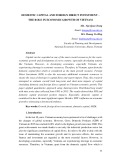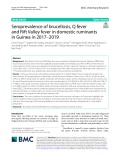
Domestic socio-economic
-
Ebook "Climate and environmental change in China: 1951–2012" presents the most up-to-date knowledge on climate and environmental change in China. It documents the evidence and attribution of climate and environmental changes in the past few decades and discusses the impacts of climate change on environments, economy, and society. The book further provides projections of climate change and its impacts in the future.
 156p
156p  giangdongdinh
giangdongdinh
 28-05-2024
28-05-2024
 2
2
 1
1
 Download
Download
-
Capital can be regarded as one of the most crucial resources for the socioeconomic growth and development of every country, especially developing nations like Vietnam. However, in developing economies, especially Vietnam, are experiencing shortage in economic resources.
 14p
14p  vipatriciawoertz
vipatriciawoertz
 26-05-2022
26-05-2022
 13
13
 1
1
 Download
Download
-
Brucellosis, Q fever and Rift Valley fever are considered as Neglected Zoonotic Diseases (NZDs) lead‑ ing to socioeconomic losses in livestock globally, and particularly in developing countries of Africa where they are under-reported. In this study, we evaluated the seroprevalence of these 3 zoonotic diseases in domestic ruminants in Guinea from 2017 to 2019.
 11p
11p  vidarwin
vidarwin
 22-02-2022
22-02-2022
 11
11
 1
1
 Download
Download
-
Dairy farming offers great opportunity for enhancing farm income and raising the socioeconomic status and quality of life of rural people. Rural women plays significant role in carrying out the responsibility of dairying through their membership in WDCS. The present study was conducted to ascertain the improvement in their quality of life through participation in dairy enterprise. For the purpose, a total 210 members of WDCS in Barauni dairy was selected by adopting appropriate sampling procedure.
 6p
6p  chauchaungayxua3
chauchaungayxua3
 07-02-2020
07-02-2020
 25
25
 0
0
 Download
Download
-
Latina/os are now the largest and fastest growing minority group in the United States, representing approximately 33 million in the year 2000, and two thirds of them are Chicana/os. However, there are major differences among Latino subgroups in terms of their cultural characteristics, immigration experiences, history, socioeconomic levels, and other important factors. It is no longer appropriate to negate these differences or to assume that all Latinos share similar psychological issues (McNeill et al., 2001).
 539p
539p  crius75
crius75
 09-01-2013
09-01-2013
 51
51
 3
3
 Download
Download
CHỦ ĐỀ BẠN MUỐN TÌM

















